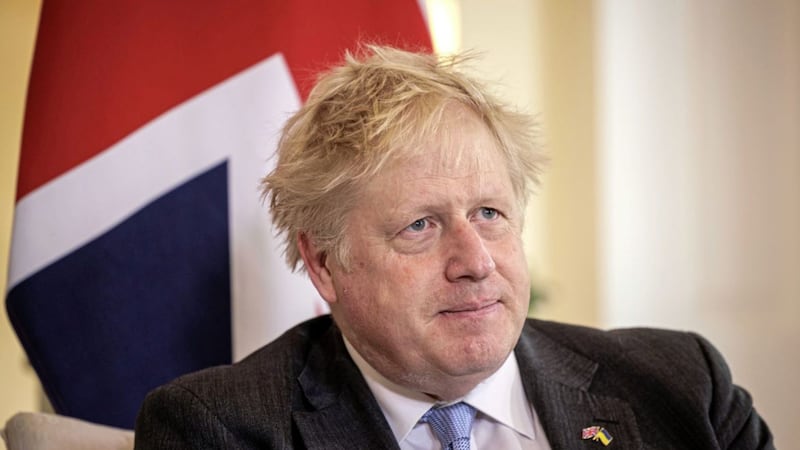With Boris Johnson due to arrive in Belfast today, it is worth reminding ourselves that the protocol arrangements he continues to castigate and seek to renege upon, thereby breaking international law, formed a central part of the oven-ready Brexit deal he campaigned for and successfully steered through the British parliament.
The protocol is not the consequence of an immaculate conception but rather a product of a Brexit championed by the sometimes bedfellows at Westminster, the Tories and the DUP.
Consider the front bench of the Tory party at Westminster, which is led by a prime minister for whom shame is destined to forever remain a distant and alien concept.
Cabinet Office Minister, Michael Ellis, last week claimed that his motivation for wanting to break international law by reneging upon the protocol aspect of that infamously baked deal would be to “protect peace and political stability”- as if a loyalist hoax bomb at Holy Cross Church and a series of poorly attended Orange hall and loyalist street protests somehow constituted a threat to either.
Then there is the foreign secretary, the ‘pound shop Thatcher’ herself, Liz Truss, who last year gave a speech on the theme of rebuilding the “muscle” of “Global Britain.”
Truss falsely asserted in her discussions with Maros Sefcovic last week that the protocol was “the greatest obstacle” to forming a new executive at Stormont, proceeding to cynically claim that scrapping parts of the protocol deal had become a matter of “internal peace and security.”
As the British government spoils for a fight with the EU, London may be about to discover what happens when you tussle with a more powerful opponent. ‘To Hell or Rwanda’ may work with the wretched of this Earth, but as a strategy it isn't going to cut it with a European Union whose economy dwarfs that of the UK.
The EU needs to demonstrate to Boris Johnson’s government that acting unilaterally and recklessly over the protocol is an act not without consequences. Sanctions of some description may be required.
The Biden administration and Houses of Congress in the United States also have a role to play in tempering the aggressive antics of Boris Johnson, and the arrival of key Congressional figures to these parts may have a key role in defusing tensions and forcing the Tories to tread more carefully regardless of the cheerleading noises from unionists and the ardent Brexiteers. The chairperson of the powerful Ways and Means committee, Richard Neal, will lead the US delegation, providing another reminder of the limitations of Britain’s muscle on the global scale in today's world.
“Very strange times in Northern Ireland. Sinn Féin trying to make Northern Ireland work. DUP trying to prevent it from working.”
So wrote Bobby McDonagh on Twitter last week as Jeffrey Donaldson’s party played out their moves to frustrate the return of a government led by a Sinn Fein First Minister.
McDonagh is a former Irish ambassador to both the EU and UK, so he has considerable experience in diplomatic affairs.
The truth is that Sinn Féin - and northern nationalism more generally - have been committed to attempting to make the north work for a quarter of a century, since the signing of the Good Friday Agreement.
Ironically, throughout that period, it has been political unionism which has acted repeatedly to attempt to thwart the evolution of a stable society at peace with itself.
Since the ceasefires of the early 90s, it was unionism that brought us Drumcree and the four and a half years of the executive’s suspension in the early 2000s. The post-St Andrews’ era period was marked by the one-time firebrand unionist leader, Ian Paisley, being ousted from his position due to the perception he had become insufficiently hostile to his republican governing partners.
More recently, the Brexit era has witnessed unionist arrogance, governance of an RHI scandal and hostility to the Irish language precipitate a protracted political crisis - all before the protocol was ever concocted and put on the table as the pragmatic best of both worlds gift to this small region.
Unionism has repeatedly walked away from talks processes and deals reached, frustrating the development of a rights-based society and perpetuating the widely held sense that Northern Ireland remains a failed statelet.
Solve the protocol and a new crisis issue will soon emerge.
Political unionism simply does not want the Northern Ireland of 2022 to work. It strives instead to recreate the very loyal British Ulster of a distant past, and the reckless and ultimately vain nature of that pursuit perpetuates the cycle of anger, disillusionment and fury amongst its own ranks.
Michelle O’Neill appropriately signalled her commitment to reach out to all communities as first minister by becoming the first leading Sinn Féin figure to use the term Northern Ireland in her inaugural speech as first minister in the assembly.
Don’t expect unionist leaders to reciprocate. They’re travelling in a different direction.









